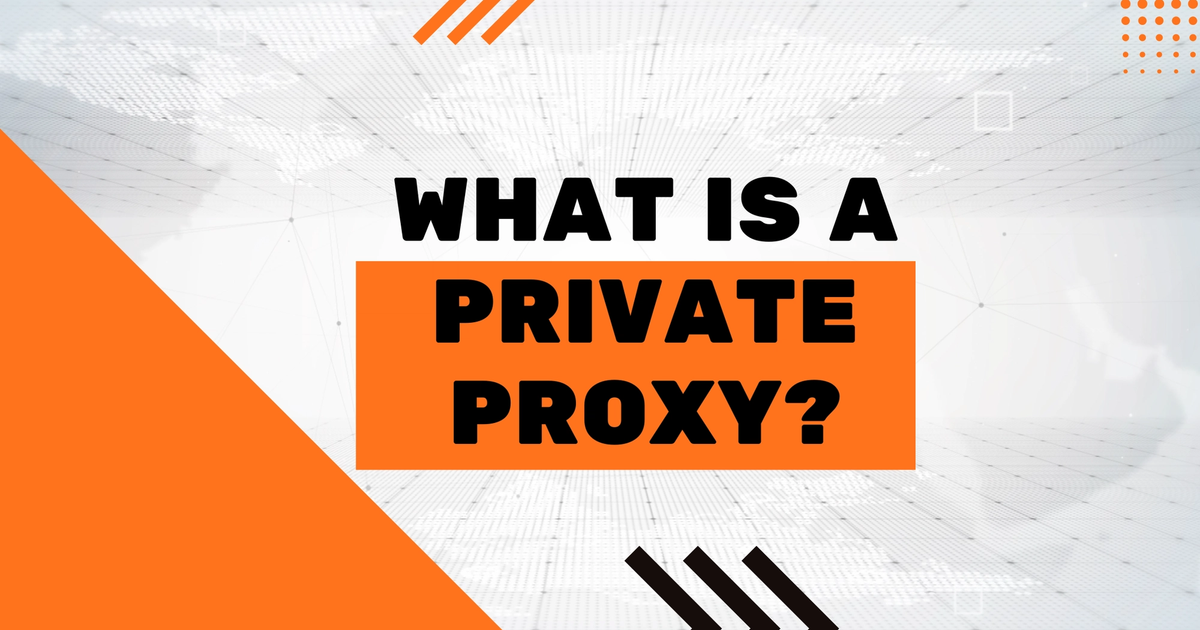What is a Private Proxy?


- What is a Proxy?
- Private Proxies for personal and corporate Use.
- Residential vs Datacenter Proxies
- The Benefits of Employing a Private Proxy
- In Conclusion
- FAQs
A private proxy, just like other types, acts as a go-between for you and the web server you want to connect to. Yet, it comes with a unique advantage, elevating it as a comprehensive choice for enhancing privacy and security on the internet. The key to maintaining anonymity lies in mastering the art of concealing IP addresses, and that’s precisely the role private proxies excel in.
In the realm of proxies, there’s a broad spectrum of proxy server providers and a diverse range of proxy types available for exploration, including:
- Residential proxies
- Data Centre proxies
- Private proxies
- Anonymous proxies
The distinctiveness of a proxy significantly influences its quality and often its cost. That's why many proxy providers offer a variety of choices, like private, shared, and semi-dedicated proxies. In this discussion, we’re zooming in on the details and advantage of private proxies
What is a Proxy?
A private proxy, or dedicated personal proxy server, is a proxy meant just for one user at a time. This ensures it’s not shared with others, granting you complete autonomy over its application and timing.
Featuring a unique IP address assigned solely to one user, a private proxy stands out because it eliminates concerns about other user’s actions that could result in IP bans from certain websites, thereby hindering your access. Possessing a private proxy not only heightens your anonymity and control over your web interactions but also typically involves a higher investment than what’s expected for shared proxies.
Private Proxies for personal and corporate Use.
Private proxies find extensive application in the business sphere as well. While individual users often deploy them to enhance anonymity, such as configuring a Chrome browser to utilize a proxy, the business applications tend to be more advanced.
Verification of Ads
For example, companies that check ads use private proxies to look at advertisers' landing pages without revealing their identity. By doing so, they can verify that their clients’ advertisements are correctly displayed and targeted to the intended audience. Relevant insights on this topic can be further explored through resources like Serply.io's Google SERP API, which offers advanced capabilities for ad verification and monitoring.

Travel Costs
Similarly, websites that compare travel prices rely on private proxies for gathering data regularly. For these sites, proxies make it possible to automatically collect information from airline websites, travel agencies online, and other sources without running into IP blocks or bans. The utility of proxies in bypassing geo-restrictions is detailed in Serply.io's documentation, particularly in sections like Google Crawl API, which facilitates efficient data scraping across various domains.
Additional Applications
Private proxies are employed for various purposes, including acquiring pricing information (such as for MAP monitoring), purchasing limited edition items, among others. To do these tasks well with proxies, you need to understand the difference between residential and datacenter proxies. Private residential proxies are preferable for scenarios where mimicking a typical internet user is crucial, whereas datacenter proxies are ideal for situations demanding fast internet speeds.
Residential vs Datacenter Proxies
Defining a Residential Proxy
A residential proxy uses an IP address given to a home by an Internet Service Provider (ISP). This homeowner then agrees to include their IP in the proxy network, receiving compensation in return. For any proxy provider focused on getting proxies the right way, this practice is crucial.
Explaining Datacenter Proxies
A datacenter proxy is represented by a virtual IP address, which is maintained on a server infrastructure. Unlike residential proxies, these dedicated IPs are usually distributed by corporate entities, not by Internet Service Providers.
The Difference Between Residential and Datacenter Proxies
The distinction among proxies extends beyond their exclusivity to their source. Looking at it this way, we see the difference between residential and datacenter proxies, which can be either shared with others or kept private for one user.
Residential proxies are linked to Internet Service Providers (ISPs) and operate on actual, physical devices. They offer unique proxy IP addresses, enhancing the ability to replicate a genuine user’s internet activities. For tasks like ad verification, collecting pricing information, and various other digital business operations, these private IPs emerge as the optimal selection.
Datacenter proxies, on the other hand, come from hosting services. Many proxies can live on a single server without slowing down the connection. These private IP addresses are ideal for handling activities that demand significant bandwidth, like email security or conducting market research.
One challenge with dedicated datacenter proxies is their uniform source subnet. Servers targeted by these proxies can identify when numerous similar IPs are accessing their services, which may engage anti-bot detection mechanisms.
It’s crucial to comprehend the distinctions between datacenter and residential proxies, especially when making the decision to purchase private proxies. For a deeper dive into how these technologies work and their applications in various industries, Serply.io's extensive documentation provides a wealth of information.
The Benefits of Employing a Private Proxy
Exclusive and Confidential
- The primary advantage of private proxy servers lies in their exclusivity. When you get private proxies, they're only for you to use.
- Utilizing private proxies significantly minimizes the chances of your personal data being exposed, offering an enhanced security level.
- Private proxies appear as distinct IP addresses, diverging from your regular ones. Residential private proxies give you more privacy, making your online actions look like those of a regular internet user.
Multiple locations
- Private proxy services typically provide IP addresses spanning across multiple regions. This feature allows for accessing materials that might be restricted in your current area. For instance, employing a proxy based in Puerto Rico access to Puerto RIcon content or a US-based proxy lets you surf the internet as though you were physically in the US
- Such a capability is beneficial for a variety of scenarios, like when dealing with websites that implement geographical restrictions or when aiming to acquire localized search results pages (SERP) information.
For more information on how this can be leveraged in real-world scenarios, Serply.io's blog post on How to Hide My IP Address offers a comprehensive guide to online privacy through the use of proxies.
Highly Efficient
- Private proxies are designed not to slow down your internet experience. Since they are allocated to a single user, bandwidth congestion is highly unlikely.
- Moreover, private proxies tend to be more dependable than their shared counterparts and typically come with no bandwidth limits.
- Choosing a private IP proxy from a datacenter can result in exceptionally fast internet speeds, as these servers often benefit from superior internet connectivity plans
In Conclusion
Though they tend to be pricier, private proxies offer numerous advantages. For many of our clients, opting for private proxies has been the most dependable choice. To explore how proxies can enhance your business, understand the distinctions between IPV4 and IPV6, or uncover other valuable data gathering tools, Serply.io provides a range of APIs and tools tailored for advanced web scraping and data analysis needs.
FAQs
Q1. How can I use a private proxy?
A1. A private proxy serves multiple uses, such as verifying advertisements, aggregating travel fares, monitoring Minimum Advertised Price (MAP), among other applications.
Q2. What sets a private proxy apart from a dedicated IP proxy?
A2. Private and dedicated IP proxies essentially refer to the same concept: a proxy server exclusively used by a single user.
Q3. Should I go for a private or shared proxy?
A3. Your decision should be guided by your financial plan and the specific online activities you plan to undertake using proxies. Private dedicated proxies provide greater privacy and a reduced chance of IP address blocking but are more expensive. On the other hand, shared proxies tend to be more affordable, though they carry a higher risk of being blocked by the sites you wish to access.
Q4. Is investing in private mobile proxies a good idea?
A4. Private mobile proxies might not always be the most reliable option because mobile connections are inherently less stable, with the potential for the source to become unavailable unexpectedly. Therefore, proxy services often offer shared mobile proxies, the IPs are frequently rotated, ensuring better availability and uptime.
For further reading and resources on private proxies and their applications, Serply.io's dedicated section on What is a Private Proxy? offers detailed insights and practical advice.